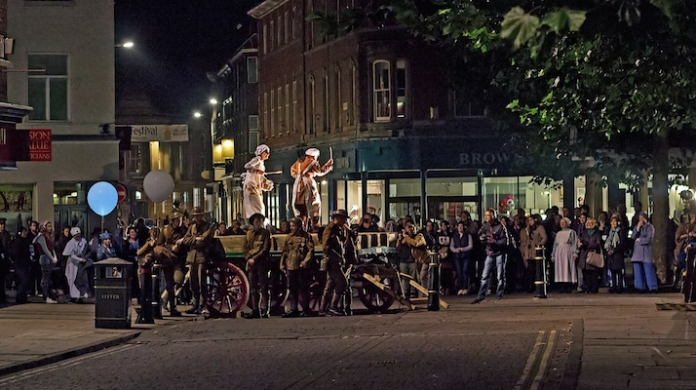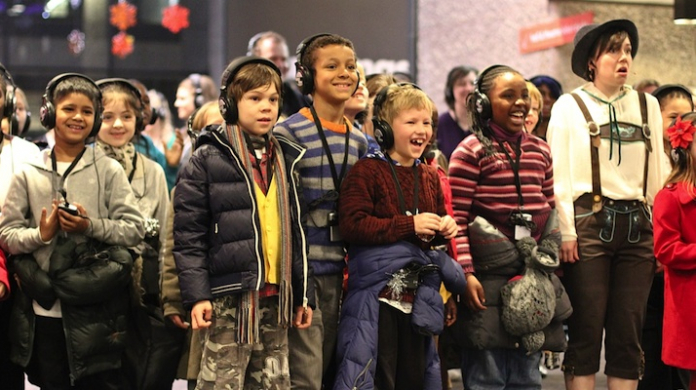Alan Lane, Artistic Director of Slung Low, talks to Eleanor Turney about money, vegetables and having his perspective shifted
"Going to the theatre must be more than being a customer"
Slung Low was started in 2000 by a group of University of Sheffield graduates. We decided that we wanted to be a theatre company at a time when that phrase didn't really mean anything to us. All of us came from backgrounds that had no contact with professional theatre. We managed to get all the way through a three-year degree without any of us knowing who Forced Entertainment were, which is almost Olympic-standard ignorance! So that was our background...
We spent a number of years just doing it, but in a vacuum. We'd put on a new musical and think that we'd invented a new form, and then discover that no, Sondheim had been doing it for years and actually we hadn't been doing it very well. So there were quite a few years of practical exploration, as we tried to find a hook with which we could access the industry. In the mean time we got on with being actually quite bad but very earnest and working very hard.
"The pieces we make examine what it is to go to the theatre..."
After that first five years, we met up with Iain Bloomfield at Theatre in the Mill. He was pivotal for us, in terms of giving us the space and engaging with us so that we realised that what we were doing was in the context of theatre already being made. That was when we began properly, six years ago. We started to make work that moved an audience. The pieces we make examine what it is to go to the theatre. The last three or four years, we've become the company we are now. We run The HUB [Holbeck Underground Ballroom] in Leeds, as a communal resource for other artists, we invite other people's work here, and try as much as possible to use the HUB as a community venue that our work then bounces off. Even when we're making work over in York, we're aware that we're still running shows in the HUB, still trying to stay in touch.
Every six months, this company has evolved, and over the past 14 years it has evolved a lot. We do that by talking to people who turn up to see the shows. The past four years, working on what it is to be a theatre company, that has to be a dialogue. At the heart of what we've been doing, which kind of crept up on us, is exploring the idea that going to the theatre must be more than being a customer. It just must. One of the ways you can do that is by not taking any money. That's a really simple way of making sure that going to the theatre is more than just being a customer, but there are loads more ways of doing that – large community casts, playing with the space and people not quite realising that they're an audience for a long time. That's at the heart of what we're doing. Being a member of a theatre audience, going to the theatre, has to be more than just being a customer.
"At the heart of what we've been doing is exploring the idea that going to the theatre must be more than being a customer. It just must."
Practically, the idea of being a community theatre means a lot. What it means for us at the minute is 22 pay-what-you-decide performances in the past 12 months – that's 22 different shows visiting the HUB. It means drinks at the bar being only a quid. It's the fact that we've made work in our local working men's club and supermarket in the past 12 months, the fact that there were 180 people in Blood and Chocolate, a show we made for the people – all the performers are community members. It's not one thing, it's 25 different things...
I'm convinced that our allotment is absolutely vital. We have an allotment in bath tubs – bathroom fitters throw out a lot of bath tubs, they rip them out and then they have to pay for disposal. We got in touch and asked if we could have them to grow things in. So we're going through a huge expansion of the allotment at the minute, and it's very hard to justify when my funders ask, “Why are you messing about with vegetables?” But I am messing about with vegetables and applying for non-arts funding to make a mobile orchard. I don't quite know how yet, but I know that in 12 months' time, you and I will be having a conversation, and it'll be about how allotments are vital and I'll be saying “Yes, of course!” At the moment, I'm saying “this allotment has to make sense somehow, keep growing vegetables, it'll all be fine”.
"When you're in a place talking about that place, you're not just making a theatre show, you're making a ceremony."
Holbeck [in Leeds] is becoming increasingly important to us. We love it. It's not a place that's had very much luck in the last 15-20 years, like a lot of the industiral north, but we love it. We go to community meetings and we're part of networks and we know the names of everyone in the local supermarket – it's home in that sense. We feel that if we're going to be here, it's important that we don't, for a second, think that we're “other”. So there's that, but place generally is important to our shows – we've talked a lot about what touring means, especially in relation to our work with the British Council.
We make work for a specific place, and very few of our shows can go anywhere else. Blood and Chocolate would make no sense anywhere else, even if you could find 180 people to be part of it. When you're in a place talking about that place, you're not just making a theatre show, you're making a ceremony. Doing Blood and Chocolate somewhere else would be a bit like watching a wedding where the people don't really know each other or really love each other, it just doesn't mean anything any more. An awful lot of our work is like that – if you take away the place, it doesn't mean anything any more.
I've been very lucky that I've had the opportunity to work all over the shop, and with Slung Low we're much more interested in creating relationships with new places and making new shows, new work there, rather than touring a piece we've done already. The cost of making a new show is often the same as touring the old one, and so that's one of the ways we can travel. We have another show in a caravan, called The Knowledge Emporium, where the content of the show is created by the people in each of the spaces – we're touring a format. Third Angel are brilliant at that, too, at taking a format of a show to a place, so that the place can then insert its own feeling and content. The desire to share experiences with other people is incredibly strong, and it's about figuring out the best way to take what we do to other places.
"The brilliant parts of our relationship with the British Council are when things I thought I knew are flipped..."
Our relationship with the British Council has brought many opportunities... they once sent me to the National Theatre of Croatia to direct a Chris Thorpe play in Croatian, made brilliantly dificult by the fact that neither me nor Chris speak Croatian. So the opportunity to go and work in as foreign an environment as one can imagine, in terms of directing a play, the words are quite important. The man who wrote the play was sitting next to me saying “Mate, I have no idea what they're saying”. That's definitely a moment when you think the author is dead!
The most important thing we've done with the British Council in terms of our development was taking Extroardinary to South Africa. Extraordinary is a two-hand clown-dance piece by Lucy Hind, and the other dancer, Dave Toole, has no legs. The piece is basically a clown show but it's incredibly honest and painful about why disabled South Africans are treated the way they are. It's quite provocative... In the UK, the show feels like it's about Dave, it's written that way, but in South Africa, it was like watching someone tear their skin apart – the show became about Lucy and who she is, as a South African woman. Without changing a single line, the whole show changed in South Africa – people were in floods of tears. It became incredibly emotional. It was the opposite of lost in translation – putting it in a different space made it so powerful.
Whenever you go anywhere with Dave, you're crossing boundaries. There were two young boys in a township who were absolutely convinced that he was a magician, and that he'd used mirrors to make his legs disappear. I'll remember that moment for a very long time. Fundamentally, the brilliant parts of our relationship with the British Council are when things I thought I knew are flipped by being given a whole new world to watch them in, whether that's sitting in a room listening to Croatian, or watching Dave wheel his way through a township being chased by boys who think he's a wizard. Those are moments when my perspective has been shifted. I hope that all the people we've worked with would say the same.
Alan Lane is Artistic Director of Slung Low. He was talking to Eleanor Turney. Follow Alan on Twitter @SlungLowAlan, Eleanor @eleanorturney and @UKTheatreDance for all of the latest blogs, news and opportunities.

